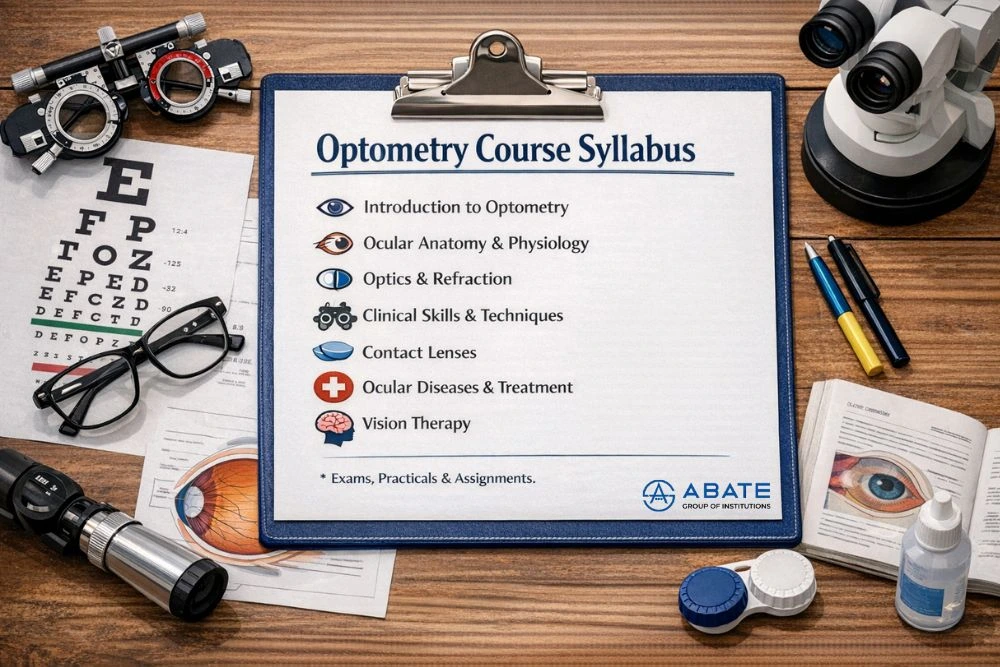Future of Vision Care in India: Opportunities for Optometrists

In recent years, India has witnessed a dramatic shift in how vision care is perceived and delivered. With rising awareness about eye health, the growing prevalence of lifestyle-related vision problems, and the increasing use of digital devices, the demand for qualified optometrists is higher than ever before. This creates a unique opportunity for aspiring students to enter a rewarding profession that not only ensures career stability but also contributes to improving the quality of life for millions.
Growing Need for Eye Care in India
India is home to the world’s second-largest population, and unfortunately, it also has one of the highest burdens of preventable blindness and visual impairment. According to recent studies, nearly 135 million Indians suffer from some form of vision problem, ranging from refractive errors and cataracts to glaucoma and diabetic retinopathy.
As screen time continues to rise among children and working professionals, issues like digital eye strain and myopia are becoming common at a younger age. The healthcare sector, therefore, needs trained professionals who can identify, manage, and treat such conditions effectively. Optometrists are uniquely positioned to fill this gap.
Why Optometry is the Career of the Future
Optometry is no longer limited to prescribing glasses and contact lenses. Today, the role of an optometrist has expanded to include specialized care such as low vision therapy, pediatric vision care, and advanced diagnostic procedures. With technological advancements like AI-driven retinal imaging, tele-optometry, and minimally invasive vision correction techniques, optometrists are expected to play a central role in the future of healthcare.
For young students, this means stepping into a field where innovation, growth, and career div
ersity are guaranteed. Opportunities are not confined to hospitals alone—optometrists can work in research, corporate eye care, startups focusing on health tech, NGOs, or even set up their own practices.
Career Opportunities for Optometrists
- Clinical Practice – Working in hospitals, clinics, or private practices to diagnose and manage eye conditions.
- Corporate Sector – Joining optical chains, eyewear brands, or multinational companies in product development, training, and quality assurance.
- Public Health – Contributing to large-scale vision screening programs, rural health initiatives, and awareness campaigns.
- Academics and Research – Pursuing teaching or research to develop innovative technologies and treatments in vision science.
- Entrepreneurship – Starting independent clinics, optical showrooms, or tele-optometry ventures that cater to underserved communities.
Education: The First Step Toward a Rewarding Career
To be part of this growing profession, the first step is to pursue the right education. India has several institutions that offer degree programs in optometry, and one such reputed name is Abate Institute, which focuses on providing students with a blend of academic knowledge, practical training, and real-world exposure.
For students seeking a solid foundation, a Bachelor of Science in Optometry opens doors to multiple career pathways. Among the options available, there are also well-recognized bsc optometry colleges in malappuram, making it easier for students from Kerala to pursue this profession close to home.
The curriculum of such programs not only covers core subjects like ocular anatomy, refraction, and clinical optometry but also trains students in emerging fields such as contact lens technology, visual rehabilitation, and advanced diagnostics. This ensures graduates are industry-ready from day one.
The Future of Vision Care in India
Looking ahead, the future of vision care in India is poised for transformation. Several factors will shape this journey:
- Technology Integration – AI, machine learning, and telemedicine will revolutionize diagnosis and treatment.
- Preventive Eye Care – Greater emphasis on early detection and lifestyle interventions will reduce the burden of avoidable blindness.
- Government Initiatives – Programs such as the National Programme for Control of Blindness (NPCB) will continue to create opportunities for optometrists.
- Global Opportunities – With an internationally recognized degree, Indian optometrists will also find opportunities abroad in countries facing similar challenges.
Conclusion
The demand for qualified optometrists in India is only set to rise in the coming decade. With the right education and training, graduates will not only secure fulfilling careers but also make meaningful contributions to society. Institutions like Abate Institute play a crucial role in nurturing the next generation of vision care professionals, equipping them with the skills and confidence to excel in a rapidly evolving healthcare sector.
For students who are passionate about healthcare, technology, and making a difference, optometry is not just a career—it is a calling. The future of vision care in India is bright, and the opportunities for optometrists are limitless.


